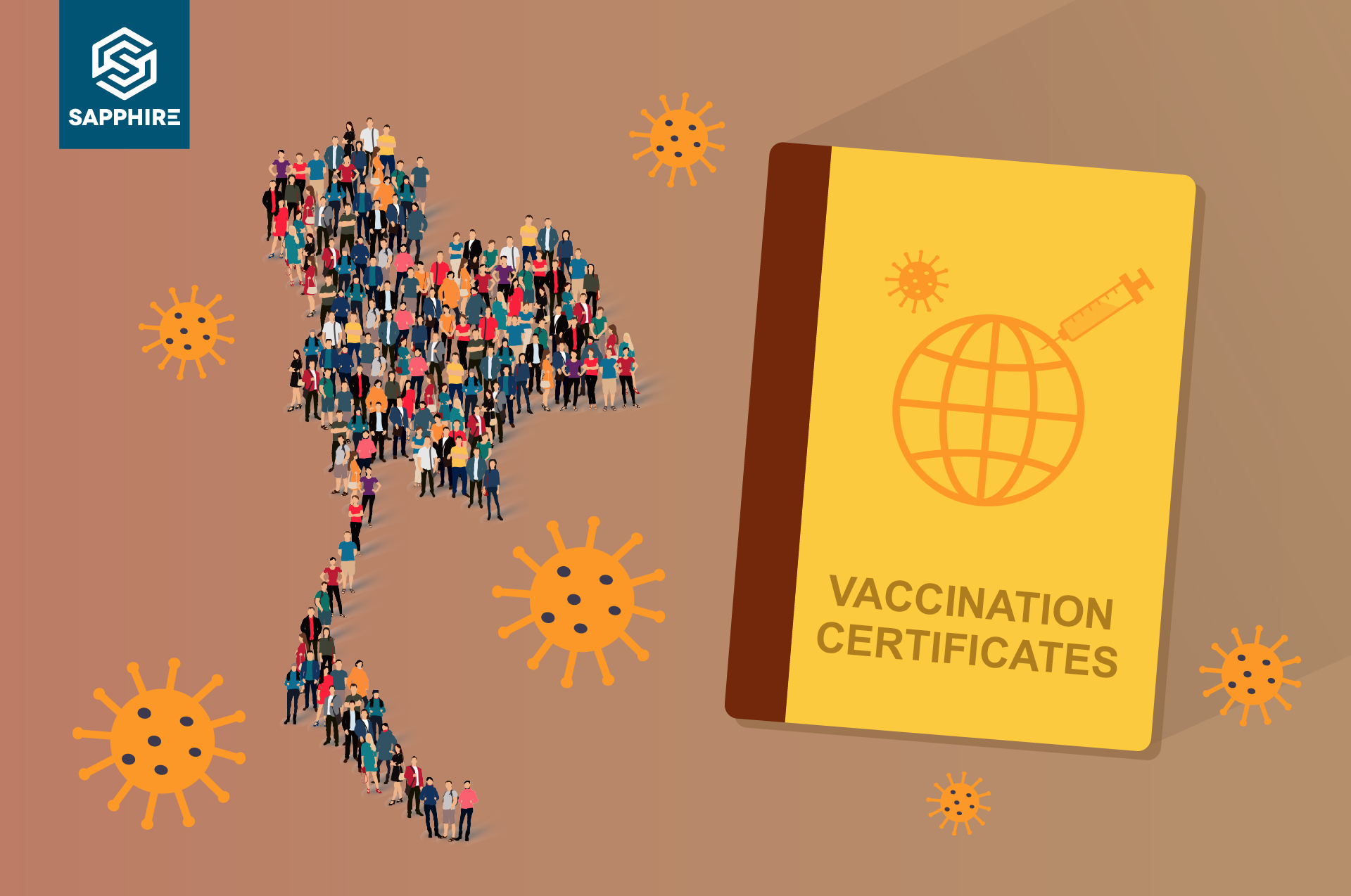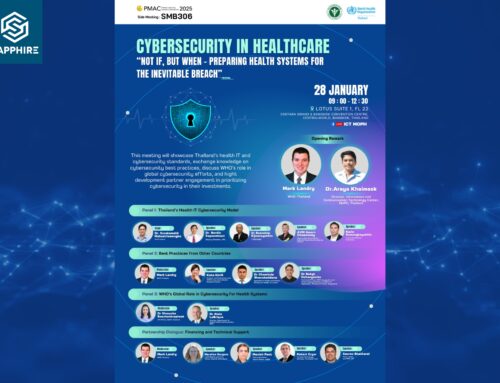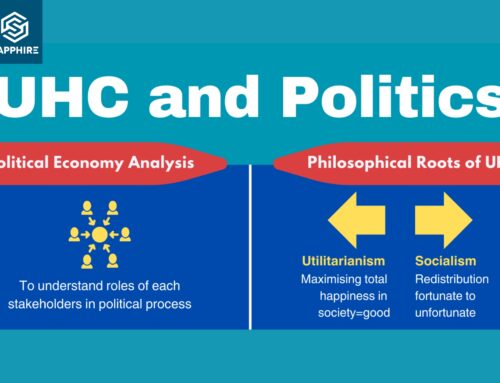
The COVID-19 pandemic has affected all sectors of activity, public health, business, and civil society. With several attempts to re-open borders and kick-start the economy, “vaccine passports” or “vaccination certificates” are now in the spotlight. Although countries across the world have already introduced such instruments, there is still limited information on how best to use them. To further understand the contextual application of vaccination certificates in Thailand, the Health Intervention and Technology Assessment Program (HITAP), Ministry of Public Health, hosted a webinar on 9th April 2021. Titled “COVID Marathon – The First Finishing Line: Re-opening the Country by Using Vaccine Passport?”, the session brought together representatives from the Ministry of Foreign Affairs and the Thai Chamber of Commerce to provide insights into the topic.
Vaccine passports versus vaccination certificates: what is the difference?
Dr. Yot Teerawattananon, the Founding Leader of HITAP, explained both terms: vaccination certificates provide proof of vaccination, while immunity certificates demonstrate proof of immunity and include those who have gained natural immunity from previous infection [1]. Vaccine passports contain information on proof of vaccination and might need international recognition. Immunity passports may include people who have not been vaccinated but have natural immunity and are now free from infection.
Stakeholders in Thailand tend to prefer the term “vaccination certificates” since it is more likely to be practical as compared to “passports” that require mutual agreement between countries. Ms. Pemika Lusnanon, Head of Protection/Services for Thai Nationals, Thailand Trade and Economic Office, Ministry of Foreign Affairs (MoFA), added that vaccine passports will take time to enforce due to the need for establishing an international standard, including, for example, recognition by the World Health Organisation (WHO). Having examined vaccination certificates from different countries, the MoFA found that most vaccination certificates contain two parts, personal information such as name, date of birth, passport number, as well as vaccine information, such as brand of vaccine, date of vaccination, certifying authority and other similar details.
The choice of term “passports” or “certificates” can also signal different types of behaviour. “For example, if there are 300,000 people vaccinated, this will mean that 300,000 people will have the privilege to travel abroad whereas more than 60 million people, who remain unvaccinated, will be unable to, which can create tensions among people. On the other hand, if we allow 30,000 people that have gained immunity through infection to travel, it could encourage more people to get infected,” suggested Dr. Yot.
With limited information available on these instruments, it is vital that we assess their impact and utility in several contexts, including nationally in Thailand.
Framework to assess the impact of vaccination certificates
HITAP has developed a framework to assess the impact (cost and benefits) of COVID-19 using vaccination certificates as part of the COVID-19 Vaccination Policy Research and Decision Support Initiative in Asia (CORESIA): a regional study on vaccination certificates, together with 10 countries, including China, India, Indonesia, Japan, Lao PDR, Malaysia, the Philippines, Singapore, South Korea, and Thailand. This framework (Figure 1) models the cost and benefits of COVID-19 vaccination certificates or related instruments, factoring in scenarios such as differential quarantines and testing policies for vaccinated individuals, improved economic incentives of freely operating economies and tourism, while considering new variants and other clinical uncertainties. For instance, the reduction in quarantine time will increase the number of inbound travelers who will help boost the country’s economy. On the downside, lowered quarantine time may result in infected persons potentially increasing the spread of infection locally. This would increase the cost of government surveillance and treatment, also perhaps leading to a costly national lockdown. More details on the framework of CORESIA are available here.

Figure 1: Framework to assess the impact of vaccination certificates
Vaccination certificates as a tool for re-opening borders?
The main goal of vaccination certificates is to safely re-open borders and the economy. “Closing borders has had a huge impact on the economy and entrepreneurs have been severely affected. International travel will help the economy recover; vaccine passports are the need of the hour,” said Dr. Sombat Thanprasertsuk, the Thai Chamber of Commerce representative.
Thailand has closed its borders to tourists due to the COIVD-19 pandemic which has had a severe impact on several sectors. However, the country plans to launch the “Phuket Sandbox” programme, opening the country for tourism. Outlining this initiative, Dr. Sombat said “Currently, there is a policy to make Phuket a pilot province to open the country for vaccinated travelers with proof of being free from infection, without quarantine, starting 1st July 2021.”
Some other countries have already announced vaccination certificates for pandemic recovery. Australia and New Zealand have established a travel bubble for quarantine-free travel between two countries [2]. Additionally, in Israel, 5.4 million people or more than half of its population has been fully vaccinated (as of 19th May 2021) [3], using a digital application of vaccination certificates (called Green Pass) as an entry permit to access specified events and venues. Greece, Cyprus, and Israel have negotiated to allow Israeli vaccination certificate holders to travel to these countries without quarantine restrictions [4].
However, before Thailand can move forward with re-opening the country to tourism using vaccination certificates or similar travel instruments, the country must contend with its new wave of COVID-19 cases. Alluding to this concern, Dr. Sombat suggested that it is difficult to ascertain an ideal quarantine period for tourists traveling with these travel instruments. While lower infection rates in departure countries could support lowered quarantine period on arrival for vaccination certificate holding-tourists, the current priority for Thailand would be controlling the national disease outbreak and ensuring safety of the local population.
Furthermore, it is not clear to what extent the use of vaccines will limit the spread of infection compared to non-pharmaceutical interventions such as quarantine of travelers. “The key objective of vaccination right now is to reduce the risk of future health problems so as to reduce severity of the disease and hospitalisation,” said Dr. Sombat. Dr. Yot added that there are three types of efficacies of COVID vaccines: preventing infection, preventing transmission, and reducing severity. Currently, most vaccines have been shown to reduce severity of disease and safety from death, but evidence on their ability to control transmission, among other unknowns is limited.
In further understanding vaccination certificates, the overarching social and ethical considerations are just as crucial in directing our efforts.
Will vaccination certificates widen the equity gap?
The Director-General of the WHO, Dr. Tedros Adhanom Ghebreyesus, said that “the world is on the brink of a catastrophic moral failure”, while addressing the skewed distribution of COVID-19 vaccines to higher-income countries as compared to lower-income countries, representing global inequities in access to the vaccines [5]. Dr. Yot emphasised that “when re-opening borders with vaccination certificates, we do not want to see developed countries, that have more vaccines, being the only ones who benefit, while developing countries are unable to. That will lead to more inequity”. While the Thai government plans on providing free vaccines, they will be priced as per demand when sold by the private sector. With only limited vaccine supplies, those who can pay the asking price by the private sector will benefit, potentially excluding those in need.
Moreover, Dr. Yot highlighted that vaccination certificates are a short-term solution, with their use no longer being necessary when many people in the world get vaccinated. Dr. Sombat also offered an optimistic view about the management of the COVID-19 situation in Thailand, suggesting that “we, the government, ministries and the general public, understand this disease fairly well and can surely control the pandemic”.
Conclusion
All speakers provided a better understanding of vaccination certificates and the considerations needed for their implementation. The immediate priority is to control the pandemic within Thailand, after which we can move forward to safely revive the country’s economy by re-opening our borders.
Acknowledgement
Special thanks to Ms. Aparna Ananthakrishnan and Ms. Saudamini Vishwanath Dabak for their help and suggestions in writing this blog.
References
- Department of Home Affairs, Australian Government. (n.d.). New Zealand safe travel zone: COVID-19 and the border. COVID. https://covid19.homeaffairs.gov.au/new-zealand-safe-travel-zone.
- Health Intervention and Technology Program Assessment (HITAP). (2021). Review of Literature. In Recovering from the COVID-19 pandemic: A white paper on vaccination certificates and other related instrument (p. 4).
- Ministry of Health. (n.d.). Corona Traffic Light Model (Ramzor) Website. https://corona.health.gov.il/en/.
- Smith, H. (2021, February 15). Post-Covid tourism hopes buoyed by deal between Greece, Cyprus and Israel. The Guardian. https://www.theguardian.com/world/2021/feb/15/post-covid-tourism-hopes-buoyed-by-deal-between-greece-cyprus-and-israel.
- World Health Organization. (2021, January 18). WHO Director-General’s opening remarks at 148th session of the Executive Board. World Health Organization. https://www.who.int/director-general/speeches/detail/who-director-general-s-opening-remarks-at-148th-session-of-the-executive-board.



